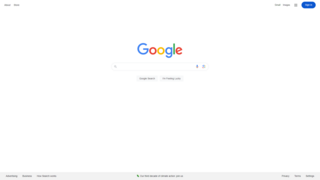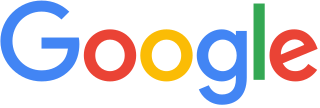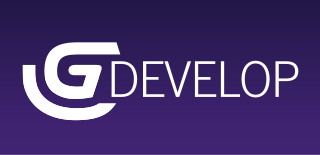
Google Search is a search engine operated by Google. It allows users to search for information on the Web by entering keywords or phrases. Google Search uses algorithms to analyze and rank websites based on their relevance to the search query. It is the most popular search engine worldwide.
Spamdexing is the deliberate manipulation of search engine indexes. It involves a number of methods, such as link building and repeating related and/or unrelated phrases, to manipulate the relevance or prominence of resources indexed in a manner inconsistent with the purpose of the indexing system.
Search engine optimization (SEO) is the process of improving the quality and quantity of website traffic to a website or a web page from search engines. SEO targets unpaid traffic rather than direct traffic or paid traffic. Unpaid traffic may originate from different kinds of searches, including image search, video search, academic search, news search, and industry-specific vertical search engines.

Googlebot is the web crawler software used by Google that collects documents from the web to build a searchable index for the Google Search engine. This name is actually used to refer to two different types of web crawlers: a desktop crawler and a mobile crawler.

Ask.com is an internet-based business with a question answering format initiated during 1996 by Garrett Gruener and David Warthen in Berkeley, California.
Google AdSense is a program run by Google through which website publishers in the Google Network of content sites serve text, images, video, or interactive media advertisements that are targeted to the site content and audience. These advertisements are administered, sorted, and maintained by Google. They can generate revenue on either a per-click or per-impression basis. Google beta-tested a cost-per-action service, but discontinued it in October 2008 in favor of a DoubleClick offering. In Q1 2014, Google earned US$3.4 billion, or 22% of total revenue, through Google AdSense. In 2021, more than 38 million websites used AdSense. It is a participant in the AdChoices program, so AdSense ads typically include the triangle-shaped AdChoices icon. This program also operates on HTTP cookies.

Parental controls are features which may be included in digital television services, computers and video games, mobile devices and software that allow parents to restrict the access of content to their children. These controls were created to assist parents in their ability to restrict certain content viewable by their children. This may be content they deem inappropriate for their age, maturity level or feel is aimed more at an adult audience. Parental controls fall into roughly four categories: content filters, which limit access to age inappropriate content; usage controls, which constrain the usage of these devices such as placing time-limits on usage or forbidding certain types of usage; computer usage management tools, which enforces the use of certain software; and monitoring, which can track location and activity when using the devices.
Answers.com, formerly known as WikiAnswers, is an Internet-based knowledge exchange. The Answers.com domain name was purchased by entrepreneurs Bill Gross and Henrik Jones at idealab in 1996. The domain name was acquired by NetShepard and subsequently sold to GuruNet and then AFCV Holdings. The website is now the primary product of the Answers Corporation. It has tens of millions of user-generated questions and answers, and provides a website where registered users can interact with one another.

A search engine is a software system that provides hyperlinks to web pages and other relevant information on the Web in response to a user's query. The user inputs a query within a web browser or a mobile app, and the search results are often a list of hyperlinks, accompanied by textual summaries and images. Users also have the option of limiting the search to a specific type of results, such as images, videos, or news.

Naver is a South Korean online platform operated by the Naver Corporation. The Naver provides community services including blogs and cafes, other convenient services such as knowledge shopping, maps, books, e-mail and naver tool bar.
Microsoft family features is a free set of features available on Windows 10 PC and Mobile that is bundled with the Windows 10, Home edition operating system. On July 17, 2020, Microsoft released Microsoft Family Safety on Google Play and App Store (iOS) as well. Starting in Windows 10, a Microsoft Account is required to use the Microsoft family features. A parent can manage settings for a child if both of their Microsoft Accounts are in the same family. When parents turn on settings for their child, these settings are applied to every device that the child logs into with that Microsoft Account.
The Facebook Platform is the set of services, tools, and products provided by the social networking service Facebook for third-party developers to create their own applications and services that access data in Facebook.
KidZui was a web browser designed for children developed by KidZui, Inc. The KidZui browser used a Zooming User Interface paradigm to make browsing easier for children. Search results appeared as scaled-down images of websites, videos, and pictures that children click on to zoom in and see the content. Children can also browse by category without typing search terms. The KidZui browser did not access the open Internet. KidZui uses teachers and parents to screen content and maintains a database of approved URLs. The KidZui browser could only access URLs in the approved database. Children built avatars called Zuis to represent themselves online. They earned points for web browsing and used points to gain levels and buy clothes and accessories for their Zuis. Children could share KidZui content with friends online. To add a friend online, children needed to know the friends Zui name. There was no online directory of Zui names, so children needed to get their friends Zui names offline in order to add them. Friends also needed to be approved by parents before they become available in the browser. KidZui also tracked children's Internet usage and sends reports to their parents on what their children looked at online.
KidRex.org is a visual child-safe search engine powered by Google Programmable Search Engine. The website utilizes Google SafeSearch and maintains its own database of inappropriate websites and keywords. Additionally, social media websites are blocked by KidRex. Kidrex Pro is a premium version of the website with more features. Kidrex Pro Is currently being re-imagined into a brand new service.
KIDOZ is a Content Discovery network designed for children. The platform is based upon a sophisticated COPPA compliant machine learning technology platform which analyses big data and knows to recommend the most relevant content for each and every kid based on their usage behaviour.

Yahoo! Kids is a public web portal provided by Yahoo! Japan to find age-appropriate online content for children between the ages of 4 and 12. This site was formerly available in English via Yahoo!, where it was known as Yahooligans! until December 2006, and in Korean via Yahoo! Korea.

Common Sense Media (CSM) is an American nonprofit organization that reviews and provides ratings for media and technology with the goal of providing information on their suitability for children. It also funds research on the role of media in the lives of children and advocates publicly for child-friendly policies and laws regarding media.

Elsagate is a controversy surrounding videos on YouTube and YouTube Kids that were categorized as "child-friendly", but contained themes inappropriate for children. These videos often featured fictional characters from family-oriented media, sometimes via crossovers, used without legal permission. The controversy also included channels that focused on real-life children, such as Toy Freaks, that raised concern about possible child abuse.

Kiddle.co is a web search engine and online encyclopedia emphasizing safety for children. Kiddle search is powered by Google Programmable Search Engine and employs SafeSearch with additional filters. Kiddle is powered by Google Custom Search but is not affiliated with Google LLC. It has been mistaken for a Google product in several news articles and blogs due to its name.

GDevelop is a 2D and 3D cross-platform, free and open-source game engine, which mainly focuses on creating PC and mobile games, as well as HTML5 games playable in the browser. Created by Florian Rival, a software engineer at Google, GDevelop is mainly aimed at non-programmers and game developers of all skillsets, employing event based visual programming similar to engines like Construct, Stencyl, and Tynker.











